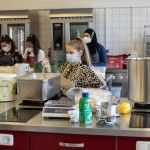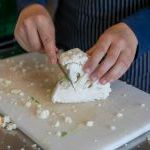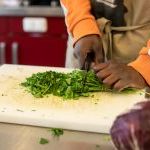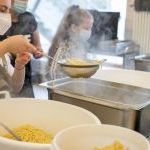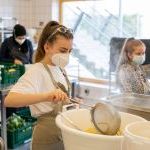Boiled cooking project
This project combines practice and theory. The main focus is on nutritional education. Under the guidance of professional chefs (paid staff members of the school), students learn how healthy dishes are made. Each class cooks for the whole school for a week once each school year. A working group is continuously developing year-specific recipies and cooking instructions. Some of the products come fresh from their own school garden. The 'cooking weeks' are also accompanied by theoretical lessons and a themed visits, such as a visit to an organic farm.
Website
Useful links
Washingborough Academy in the UK cook healthy snacks with their pupils each week which are sold in the Snack Shack
Country
Media
Source photos: Frederike Diedrich
* TOP TIP *
'Why not harness the skills of your school cooks to inspire the pupils and offer some real-world learning? Children will then have a greater understanding of the food in their meals, and respect the role of the school chef'
How is the project linked to climate change and sustainability?
The project illuminates the entire food production chain. This paves the way for the pupils to understand more about topics such as food production, food quality, the relevance of agriculture and globalisation. In addition, awareness is raised on the issues of food waste and conservation of resources.
Who is involved?
The working group (AG Abgekocht), the canteen association and the canteen council create, among other things, an organisational and economic framework for the project. The canteen council consists of teachers, parents, students, cooks and the caterer.
How are the participants involved?
The Stübenhofer Weg school runs 'Boiled' through a project week. The children get to know exactly which foods are processed, which are fresh and those that come from our own school garden. When producing the food, they pay attention to the cultural backgrounds of the students. Practical tasks are given to the students - such as the cultivation and care of vegetables in the school garden or the preparation of meals for the entire school. This is combined with lessons to strengthen the theoretical knowledge and help ensure that healthy, fresh school meals will be popular if everybody is contributing. In addition, themed excursions such as a visit to an organic farm show the importance of sustainable food production and thus also the appreciation of the various foods and resources.
Key steps:
These are typical steps for setting up the project - you may be able to try some of these in your school:
Step 1. Set up a working group with the teachers, cooks, children, parents and any one else interested in the project
Step 2. Develop lessons that meet the curriculum and also engage pupils in topics around food
Step 3. Involved pupils in a rota to help prepare food for the rest of the school, with appropriate support and skill development
Step 4. Work on a gardening project in the school grounds to develop practical growing skills
Step 5. Organise inspiring excursions to food producers and farms
Step 6. Celebrate success by enjoying the food together at mealtime

